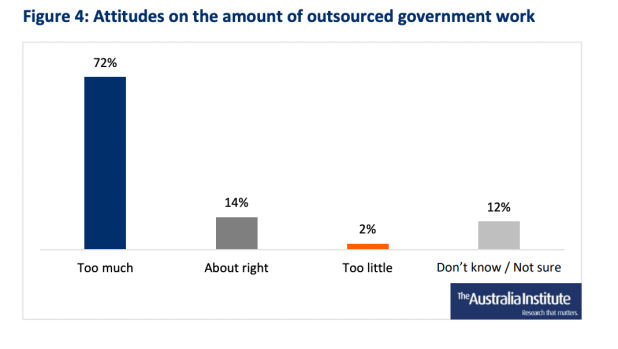Research from a leading public policy think tank shows most Australians think consultants that breach trust should be banned from dealing with government, amid the ongoing PwC consulting scandal.

It’s been revealed that the consulting giant, over the last ten years, leaked confidential government information that was used to benefit clients, sparking a parliamentary inquiry.
The Tax Practitioners Board said some PwC partners and staff engaged by Treasury to advise on improving tax laws – including measures to prevent multinational companies from dodging tax – shared confidential information that was subsequently passed on to PwC clients to help them work around the laws.
The Australia Institute survey of 1,200 Australians released last week shows significant public concern about the relationship between the consulting industry and government, with 80 per cent supporting a ban on government contracts for companies that leak information and breach public trust.
Members of the public also want reduced outsourcing of public sector work and more parliamentary scrutiny of the industry, and three quarters think the more than $1 billion spent by the federal government on consultancies last year is too much.
Calls to ban PwC
In its submission to the Upper House inquiry the Australia Institute recommends banning PwC from getting government contracts and receiving confidential government information, and calls for public service staffing caps to be abolished.
“The Australian public are clearly concerned about what has come to light at PwC,” director of the Australia Institute’s Democracy and Accountability Program Bill Browne said.
At their worst, consulting firms have leaked confidential government information to drum up business and potentially help their multinational clients avoid paying millions of dollars in tax.
Bill Browne
“PwC has abused the public’s trust by leaking government tax plans, and a proportionate response would be a ban on PwC receiving government contracts or confidential information until it has earned back that trust.
“There have to be consequences for the … abuse of trust that consulting firms have been at the heart of.
“Cuts to spending on consultancies and guidelines for when they should be used are one pillar; sanctions for consultancies that have ripped off or mislead the public must be the other.”

Government foreshadows ‘further steps’

On Monday Treasurer Jim Chalmers said the government was taking steps to wind back spending on consultants and rebuild the public service.
“There will always be a role for external expert advice but we think the balance has been wrong and we want to rebalance it,” he told the ABC.
He said the government would be “taking further steps” against PwC but declined to provide details about what that would involve or whether it would involve a ban on the company.
“We’ve taken some steps, there will be more steps to take, I’m working on them almost literally right now, and I’ll have more to say about it in due course,” he said.
Inquiries underway
The Senate Inquiry into management and assurance of integrity by consulting services is due to report by September 26.
It’s focusing on conflicts of interest, unethical behaviour, enforcement measures in response to integrity breaches, the accountability of consultants and risks to public sector integrity.
The next hearing is scheduled for June 7.
PwC announced on May 15 that Ziggy Switkowski will lead a review of the firm’s governance, accountability and culture to address issues identified by the TPB investigation into the firm’s use of confidential tax policy information.
Dr Switkowski will consider all aspects of PwC Australia’s governance, accountability and culture, including how the firm applies its professional values and ethical standards across its work, the company says.
He will report his findings and recommendations in September.





Leave a Reply